The Economy Is Far Too Important To Be Left To Economists

Economics was originally called Political Economy, and it still is, they just hide the fact that economics is inherently political. Economics is not a science, it’s just politics with charts. It’s not a class in school, it’s class warfare, waged from elite schools upon the poor.
If we define economics as the study of how we divide up resources, this has always been political, ever since Ug killed some bushmeat and wanted to give the liver to his girlfriend. And the fact is that economics has never been some isolated study of theoretical laws, it’s been the writing of laws by people in power.
Economists are the only ‘scientists’ that politicians actually listen to, which is A) terrifying and B) tells you something. Politicians used to hide behind priests, but now they hide behind economists. It used to be dudes in bedsheets waving incense, now it’s dudes with spreadsheets talking about income. Same shit different day, just a different set of reasons you don’t understand, explaining why the ruling class gets to take your stuff.
Just like Ug dividing up delicacies, economics is and always will be about power. The fact that we think of it as apolitical doesn’t make it so. It just means the ruling class has won. Economists today are able to dig around the entrails of the economy without ever getting their hands dirty. They can impoverish entire nations and it’s just like, ‘oops, I did it again’. And then they go do it again. It’s obviously not a science. Science can’t go on for so long, getting basic assumptions wrong. Economics is a naked exercise of power, barely covered in a spreadsheet.
Leo Tolstoy's critique of Political Economy in 1900 applies just as much today. It is, indeed, part of the eternal bullshit going back to Ug. Tolstoy said:
“When people behave badly they always invent a philosophy of life which represents their bad actions to be not bad actions at all, but merely results of unalterable laws beyond their control… these new explanations came in the form of science: political economy.”
Though the name has changed, the game is the same. Move the money from the people's pocket to the ruling class’s pocket, while saying this is just the way of the world. The reason could be GDP or God. It’s still the same outcome. While today we see the excuse of ‘god said so’ to be absurd, we somehow consider the same thing OK because GDP requires it. But I’m telling you to look, because we’re all getting fleeced.
So let’s look closely at the temple priests of Capitalism, the economists.
Who Economists Are
Economists are extremely white, male, and rich. Even where they’re not white or male, they’re usually rich. Even within the already expensive and exclusive world of academia, economists are a class apart.

Stansbury and Shultz researched this among US (and US-born) PhDs, which gives you a sense of how elitist economists really is. We’ll go through their data and get to the global picture later. As S&S show, Economics is the most male and the most white of all the PhD programs they looked at. They’re also among the most likely to have parents who already got higher education (itself a class marker).

Even within minority populations, economics is still full of the elites within those minorities. S&S covers US-born students, but I’m pretty sure this holds for international ones. Regardless of race, economics is populated by a certain classof people. The higher, ruling one.
Their study used parents with degrees as a proxy for class and as Stansbury said, “a US-born Economics PhD graduate is 5x as likely as their peers to have a parent with a graduate degree.”
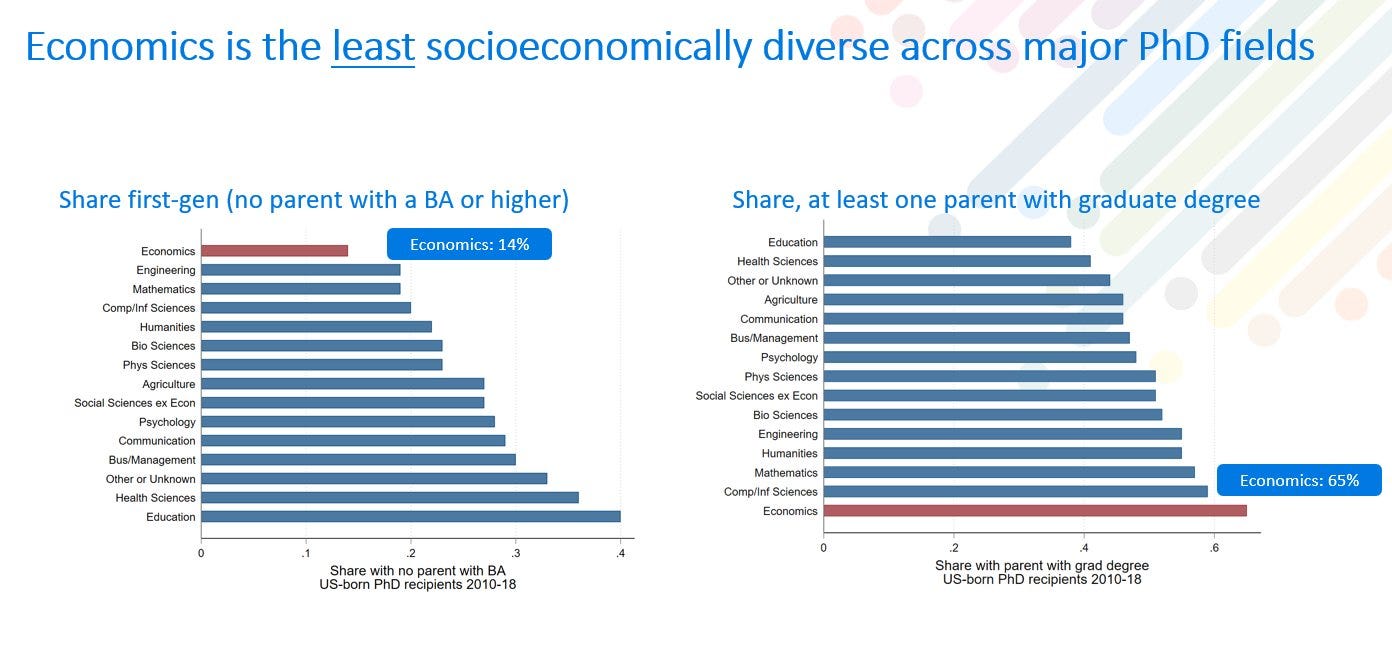
As S&S said, “economics is less socioeconomically diverse than all the major PhD fields.” And it gets even worse when you look closer. Economics PhDs let in the least people from public schools and the most from the ‘Ivy Plus’. It’s elitism filtered through elitism. If academia is an ivory tower, economics is another tower, sticking up from the very top.
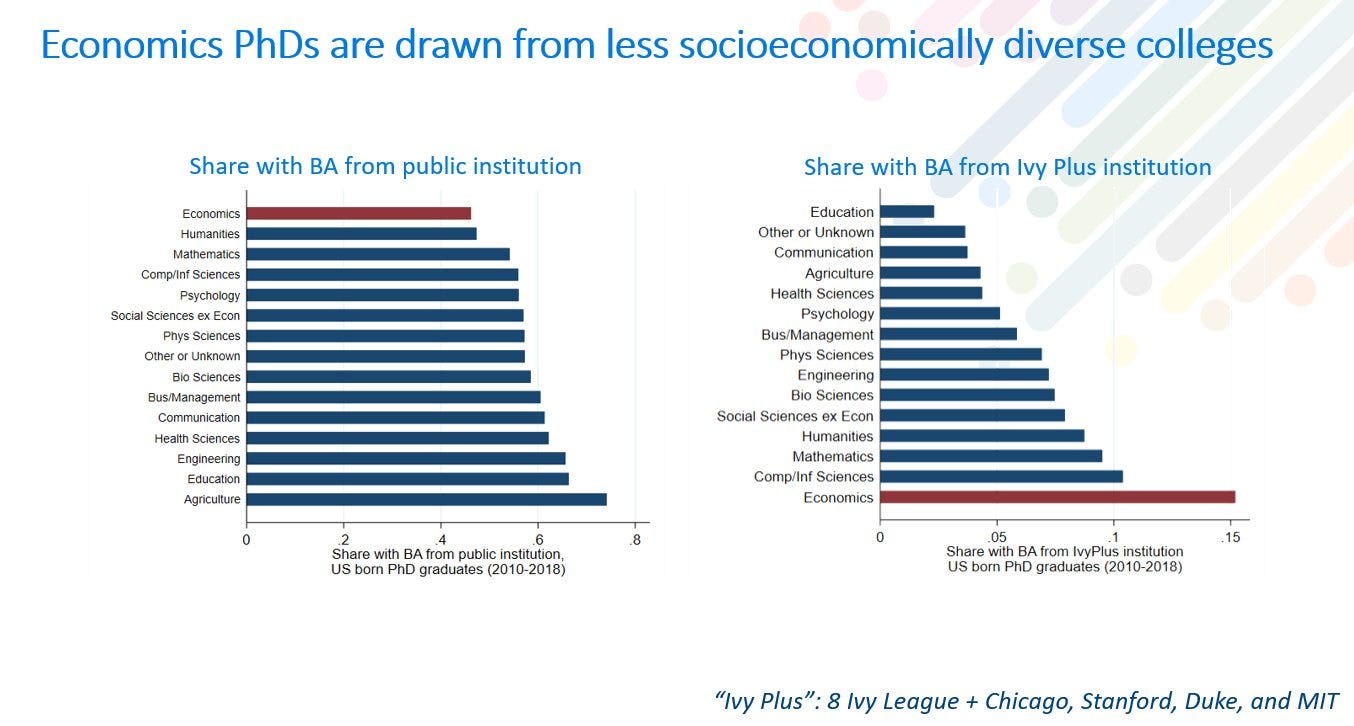
Major economic research is actually filtered through a shockingly small number of institutions, all of which feed into each other, and into power. As Stansbury said, “Todd and Sloan show that half of tenure-track faculty at economics PhD-granting institutions in the US come from the 15 “top-ranked” PhD programs.”
When it comes to publication, half of the citations in the top five journals come from just three ZIP codes. The elitism and concentration of power within the elite is shocking.
John Gibson reports that “for professional organizations, of the 120 presidents of the American Economic Association (AEA), almost 60% of them (n=68) have been from just six institutions: Harvard (23), Chicago (13), Princeton (10), Yale (9), MIT (7), and Stanford (6). This hierarchy contrasts with other social sciences.”
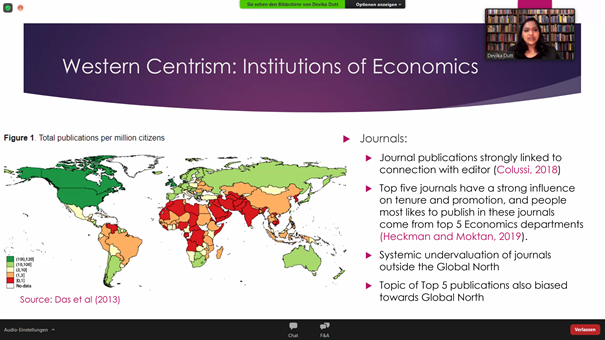
When it comes to Development Economics, this elitism tips into outright imperialism. As Arvind Subramanian and Devesh Kapur write,
Consider the Journal of Development Economics, a leading outlet for research papers in the field. Neither the journal’s editor nor any of its ten co-editors are based in a developing country. Just two of its 69 associate editors are, with Africa and Asia completely unrepresented.
Then there is the World Bank’s prestigious Annual Bank Conference on Development Economics (ABCDE). The 2019 event celebrated the 75th anniversary of the Bretton Woods conference that established the World Bank and the International Monetary Fund, but none of the 77 participants were from an institution located in a developing country.
This is a huge problem, largely because so much information about how the world actually developed is ignored, while white people are testing psychological theories on poor, largely colored populations (with no ethics at all). As Subramanian and Kapur continue:
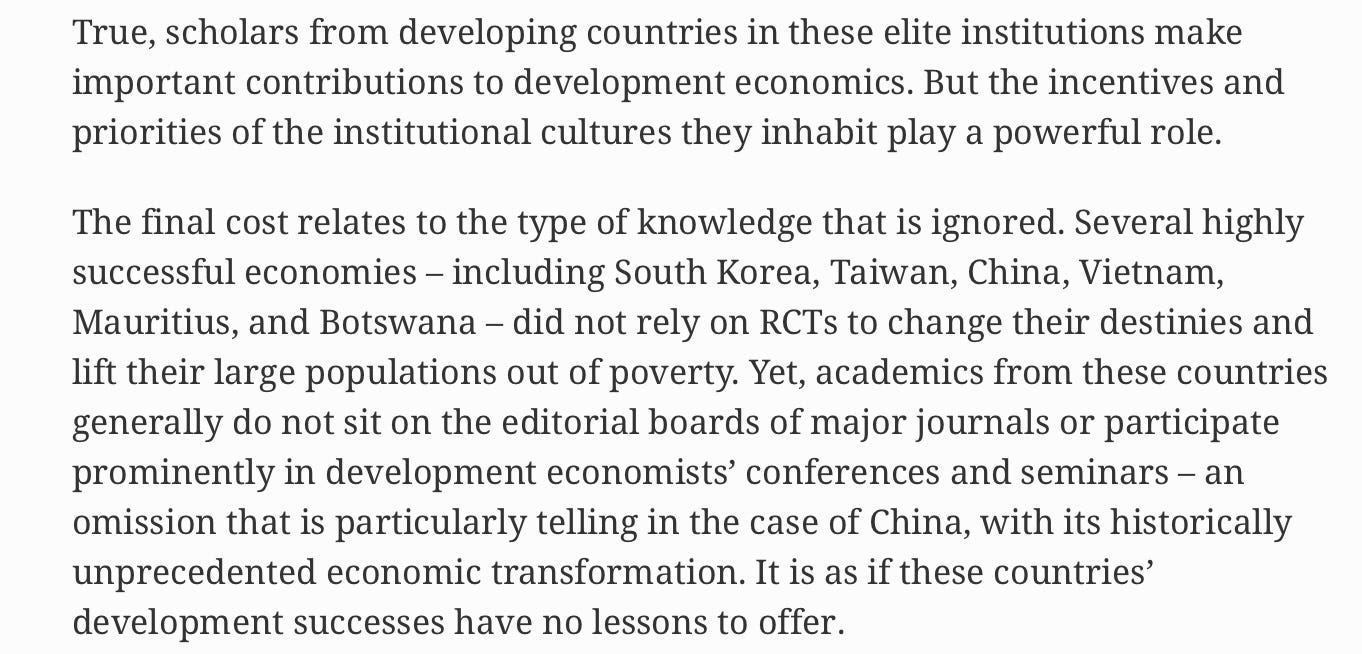
It’s not just ignorance of other countries, we have people supposedly addressing poverty who have no experience of being poor. Who are generations removed.The whole system is based on an idea of noblesse oblige, that rich people know what’s best for the poor. This was cloaked in the idea of the inherent nobility of the rich before, now it’s laundered through education. But it’s still the same few dudes, making decisions for everyone.
It’s not that they’re bad people, these economists, but they’re part of a bad system. They haven’t discovered some new science, they’ve just—as Tolstoy said—used science to justify the existing position. Then society at large acts like you need to jump this gauntlet of money and privilege (to be an economist) to even talk about ‘the economy’ at all. And that’s not cool.
Who Economists Talk To
What makes economists especially dangerous stewards of ‘the economy’ is that they’re incredibly insular. Economists talk to other economists, favoring the most elite economists, making for a severely stunted and inbred understanding of the world. Which rulers then rely upon to govern. They’re like the Hapsburgs of academia.
This data is a bit old (1997–2005), but it’s the best illustration I’ve seen of the circularity of economic citations. While other sciences routinely cite and learn from each other, economics cites itself (orange, top right). No wonder relying on economic governance is destroying the Earth. They don’t even think about it at all.
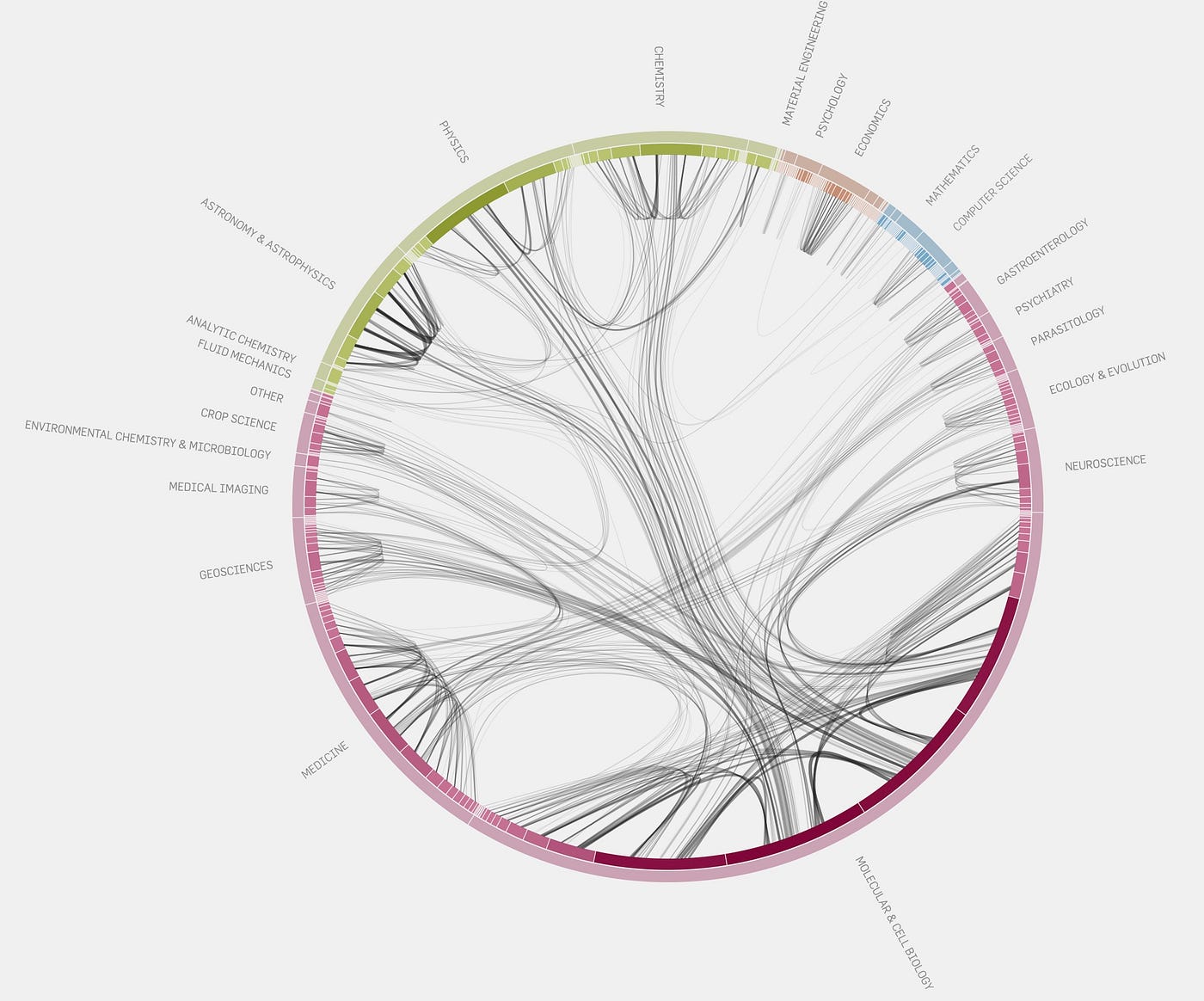
However, as cool as this map is, perhaps it doesn’t make that much sense for Economics to be citing Medicine (though actually it should, like Public Health). But let’s be a bit more lenient and look at its connections to the humanities:

This shows how much each social science cites other social sciences. Economics and psychology connect the least. As Philip N. Cohen said “Sociology cites other disciplines about 5-times as much as economics does. Specifically, sociology cites economics about 8-times more than the reverse (note different scales in the second figure).”
And here’s a broader picture showing it altogether. As you can see, Economics is the worst.

The big problem is that most economists don’t think this is a problem. As to a 2006 study on what economics professors think of this, nearly 60% disagreedwith the statement “in general, interdisciplinary knowledge is better than knowledge obtained by a single discipline.” They don’t think it’s a problem at all. They like their Hapsburg nose and being unable to breathe.
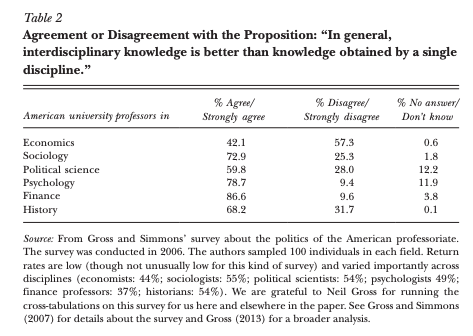
Compare this to people from other fields, who all agree, as you can see from their citations. As you can see, even people in Finance strongly agree with the idea of learning about the world in general, presumably because they have to actually make money. Economists can keep theorizing and trying the same failed ideas on poor country after poor country without consequences at all. Indeed, maintaining that power dynamic seems to be their actual duty.
So what we have here is a bunch of rich people, filtered through elite institutions, connected mainly to each other, and they’re supposed to solve world poverty? They’re supposed to help stop climate change? How? And most importantly, why?
Tolstoy puts all my points better in his amazing The Slavery Of Our Times, I too fall into the trap of relying on data when common sense suffices. As Leo said:
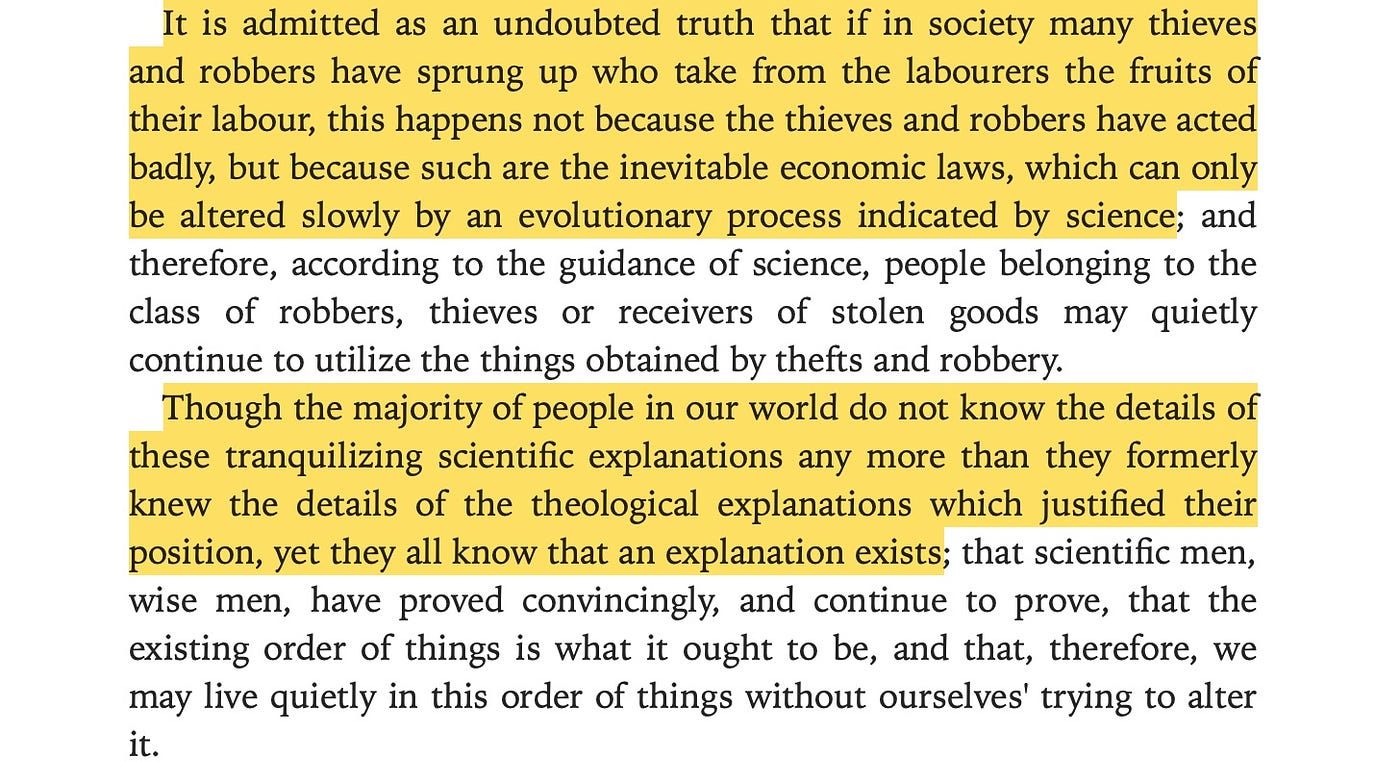
Tolstoy’s description of the lies of political economy is an even more damning condemnation of economics today, which tries to hide even within its own name. Economics today insists on slow process of change within Capitalism, but won’t even discuss the end of that system even as it ends the world as we know it.
Political economists like Marx are forever condemned to be purely political, and not discussed at all. But it’s not that people like Friedman and Keynes are apolitical. They just represent the ruling class that won. Hence economics is not a class in school, it’s a site of class warfare, with the poor being thoroughly bludgeoned. It used to be because God said so, but now it’s in some textbook. Either way, they’re taking your stuff.
This is why elite economists are the last people we should be letting near anything as The Economy™. These are the last academics we should be letting near people, the planet, or anything important, but there they are. At the right hand of our rulers, anointing them with snake oil.
Under their watch over the last century they have increased the wealth of their own class, the power of their own countries, while driving the entire planet to total collapse. If you’re looking at evidence and data, does the current collapse they didn’t predict, does every crash they didn’t predict, does any of that count?
While some people are trying to reclaim the soul of economics, and while there are certainly good economists, I’m afraid that we’ve got to tear their hallowed temple down before we build it back up. These people deserve no more respect in conversations about ‘the economy’ than a climate scientist, a social scientist, a worker, a child, or a mother.
‘The economy’ is really just the sum total of all the stuff people are doing, and if we need all the people involved. It can’t just be the elites, they’re obviously just enriching themselves and fucking everything up. The economy is far to be important to be left to economists. Honestly, they’re the worst. For a people's economy, we need people power.
Read Leo Tolstoy’s The Slavery Of Our Times, at least Chapter III—Justification Of The Existing Position By Science. He’s the best.